In May 2015, Zika virus was reported to be circulating in Brazil. This was the first identified introduction of the virus in the Region of the Americas. Since that time, Zika virus has rapidly spread throughout the region. As of April 20, 2016, the Florida Department of Health Bureau of Public Health Laboratories (BPHL) has tested specimens from 913 persons who met state criteria for Zika virus testing. Among these 913 persons, 91 met confirmed or probable Zika virus disease case criteria and all cases were travel-associated (1).
Diagnostic testing for Zika virus infection can be accomplished using molecular and serologic methods. Real-time reverse transcription–polymerase chain reaction (rRT-PCR) is the preferred test for Zika virus infection because it can be performed rapidly and is highly specific (1,2) ...
- resourceZika-05112016.pdf (95.67 KB)
In 2015, for the first time in over 20 years, the Environmental Protection Agency updated the Worker Protection Standard (WPS). The WPS provides basic workplace protections for agricultural workers to reduce the risk of pesticide exposre. This issue brief overviews the major revisions that are particularly relevant for clinicians caring for agricultural workers.
- WPS_MCN_FJ_IssuesBrief2016.pdf (3.02 MB)

DATE RECORDED: March 30, 2016
PRESENTED BY: Ileana Ponce-González, MD, MPH
This material will be produced under grant number SH-27640-15-60-F-48-SH5 from the Occupational Safety and Health Administration, U.S. Department of Labor. It will not necessarily reflect the views or policies of the U.S. Department of Labor, nor does mention of trade names, commercial products, or organizations imply endorsement by the U.S. Government.
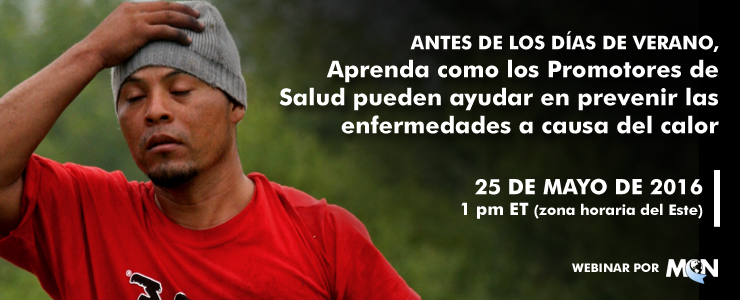
FECHA DE GRABACION: 25 de Mayo de 2016
PRESENTAOD POR: Antonio Tovar, PhD
- Ver Webinar Grabado
- Evaluacion de los Participantes
- Diapositivas de la Presentacion
Este material será producido bajo la subvención número SH-27640-SH5 de la Administración de Seguridad y Salud Ocupacional del Departamento de Trabajo de los Estados Unidos. Ni los puntos de vista ni las políticas del Departamento de Trabajo de los Estados Unidos serán necesariamente reflejados; ni la mención de nombres comerciales, productos comerciales, u organizaciones implica la aprobación por el Gobierno de EE.UU.
- http://www.migrantclinician.org/
- https://www.osha.gov/SLTC/heatstress/index.html
- https://www.osha.gov/SLTC/heatillness/spanish/index_sp.html
- https://www.osha.gov/SLTC/heatstress/industry_resources.html
- http://deohs.washington.edu/pnash/heat_illness
- http://www.dir.ca.gov/dosh/heatIllnessQA.html
- http://www.lni.wa.gov/Safety/Topics/AtoZ/HeatStress/
- http://en.hesperian.org/hhg/Workers%27_Guide_to_Health_and_Safety:Dangers_from_heat
- http://www.naplesnews.com/news/crime/report-farmworkers-death-should-have-been-prevented-2738c212-4e00-109c-e053-0100007fd972-363310521.html
The National LGBT Health Education Center provides educational programs, resources, and consultation to health care organizations with the goal of optimizing quality, cost-effective health care for lesbian, gay, bisexual, and transgender (LGBT) people.
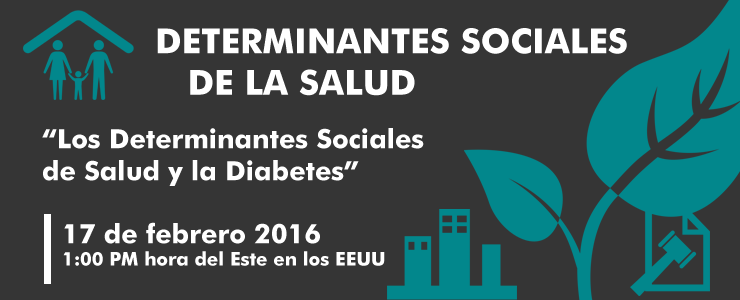
FECHA DE GRABACION: 17 de febrero 2016
PRESENTADO POR: Ileana Ponce-González, MD, MPH | Nelly Ayala, RN, MSN | Juan J Martinez, MSN, RN, CDE
- http://migrantclinician.adobeconnect.com/p4r9q058gd5/?OWASP_CSRFTOKEN=5cda39ea343db034320a5f908410459c08acbc6dc8eae39211163603ad29bfe2
- http://www.migrantclinician.org/
- http://www.ncbi.nlm.nih.gov/pubmed/11024588
- http://scholarworks.boisestate.edu/nursing_facpubs/3/
- http://www.ncbi.nlm.nih.gov/pmc/articles/PMC3662286/
- http://www.idf.org/diabetesvoice/articles/diabetes-tipo-2-su-prevenci%C3%B3n-y-la-comisi%C3%B3n-sobre-determinantes-sociales-de-la-salud-de-la
- http://www.doh.wa.gov/Portals/1/Documents/Pubs/345-342-DiabetesEpidemicActionReport.pdf
- http://ibis.dhss.alaska.gov/
- http://www.paho.org/diabetes
- http://www.diabetes.org/
- http://scielo.sld.cu/scielo.php?script=sci_arttext&pid=S1561-29532003000200008&lng=es&nrm=iso&tlng=es
- https://www.youtube.com/watch?v=_11xLlwKgWc
- http://www.hopeheart.org/our-programs/

DATE RECORDED: March 30, 2016
PRESENTED BY: Ileana Ponce-González, MD, MPH
This material will be produced under grant number SH-27640-15-60-F-48-SH5 from the Occupational Safety and Health Administration, U.S. Department of Labor. It will not necessarily reflect the views or policies of the U.S. Department of Labor, nor does mention of trade names, commercial products, or organizations imply endorsement by the U.S. Government.

FECHA DE GRABACION: 30 de Marzo de 2016
PRESENTAOD POR: Ileana Ponce-González, MD, MPH
Este material será producido bajo la subvención número SH-27640-15-60-F-48-SH5 de la Administración de Seguridad y Salud Ocupacional del Departamento de Trabajo de los Estados Unidos. Ni los puntos de vista ni las políticas del Departamento de Trabajo de los Estados Unidos serán necesariamente reflejados; ni la mención de nombres comerciales, productos comerciales, u organizaciones implica la aprobación por el Gobierno de EE.UU.
- http://migrantclinician.adobeconnect.com/p92vsy5l9ox/
- http://www.migrantclinician.org/
- http://workerscomphub.org/
- http://workerscomphub.org/navigating-system
- http://www.migrantclinician
- https://www.osha.gov/workers-spanish/index.html
- http://www.coshnetwork.org/know-your-rights
- http://hesperian.org/books-and-resources/
A primary goal of the Partnerships for Care (P4C) project is to provide innovative, cost-efficient, and culturally competent training and technical assistance (TTA) to the four health departments and 22 health centers serving high HIV prevalence areas funded under the project. To that end, the HIV Training, Technical Assistance, and Collaboration Center (HIV TAC) was funded to support the goals of the P4C project through planned collaboration with existing HIV-related TTA programs, across different levels of government and with nongovernment partners. The MayaTech Corporation operates the P4C HIV TAC.
Video interview with COPE Executive Director Mark Sullivan, MD, PhD.
About COPE: The University of Washington’s COPE for Chronic Pain CME Program offers evidence-based clinical knowledge and training on how best to treat patients experiencing chronic pain. COPE CME helps clinicians assess patients and monitor their progress, mitigate risk, and focus on restoring function and quality of life. It provides guidance on when and how to start, stop, or modify opioid therapies. COPE’s online course includes case-based video vignettes that model interactions between providers and patients, helping to improve communications that promote trust. Live and web-based CME is available.
Only 25% of physicians feel very confident in managing patients on opioids.
When many of today's physicians were in medical school, they learned that opioids were safe, and no dose seemed too high. Now, evidence-based practice paints a far more nuanced picture. More than 200 million prescriptions a year have contributed to widespread problems:
- 33% of young adults say that prescription opioids are "easy to get," with many taking their friends' or parents' pills.
- Nearly 20% of U.S. veterans with PTSD are receiving higher-dose or multiple opioids, or early refills.
- Increased prescribing to women of childbearing age has contributed to a 4-fold increase in neonatal abstinence syndrome
COPE offers free CME on safe opioid prescribing:
- COPE-REMS: an online, self-paced tutorial that awards up to 4 CME credits
- UW TelePain: Providers can call in to UW Medicine and present their most difficult chronic pain cases to a multidisciplinary panel of pain medicine experts for discussion and advice. Tune in to live, lunchtime, 1-hour sessions most Wednesdays at 12 PM to earn up to 1.5 CME credits per session.
Other resources from COPE include:
- 7 Things You Should Know about PTSD and Use of Opioid Pain Medications
- Women, Pregnancy & Prescription Opioids
- COPE-REMS has posted new content on prescribing opioids for chronic pain related to the 2015 Washington State Interagency Guideline on Prescribing Opioids for Pain. The 2015 guideline provides valuable insights for clinicians nationwide and for the federal government, which is now developing a national guideline. COPE interviewed Dr. David Tauben, Chief of the University of Washington Division of Pain Medicine.
- http://www.coperems.org/
- http://www.coperems.org/register/
- http://depts.washington.edu/anesth/care/pain/telepain/index.shtml
- http://www.coperems.org/wp-content/uploads/2015/06/flyer-ptsd-opioids-rev.pdf
- http://www.coperems.org/wp-content/uploads/2015/05/factsheet-womenpregnancy.pdf
- http://www.coperems.org/new-washington-state-opioid-guidelines/
http://www.asbestosdiseaseawareness.org/
ADAO is the largest independent nonprofit in the U.S. dedicated to preventing asbestos exposure, eliminating asbestos-related diseases, and protecting asbestos victims' civil rights through education, advocacy, and community initiatives.
http://www.cdph.ca.gov/programs/cosmetics/Pages/default.aspx
An online, searchable database that allows salon workers and others to learn about and report toxic chemicals found in nail salon products and other cosmetics.
Public Health Online includes expert-driven data and information about careers in the field, online learning options, and how students can gain valuable professional experience even before graduation. Some key features include:
- An in-depth look at public health issues and the importance of public health education
- A detailed examination of high-quality, available online public health degrees and specializations
- Tips for choosing a high-quality, affordable online program that meets the student’s education and career goal
- A public health career fit quiz
http://www.publichealthonline.org/degree-programs/masters/
The National Nework for Oral Health Access has developed a user’s guide that provides a structure, options, and suggestions to help Health Centers develop programs to implement oral health competencies that integrate oral health care into primary care practice, which increases access to oral health care and improves the oral health status of the populations Health Centers serve.
DATE RECORDED: Friday, July 11
PRESENTED BY: Ed Zuroweste, MD. Chief Medical Officer, Migrant Clinicians Network
 | |
MCN’s Environmental and Occupational Health Programs
Learn more about MCN’s training and technical assistance programs to help clinicians and health centers improve the recognition and management of pesticide exposures and other environmental/occupational health conditions.
Migrant workers are often employed in some of the most dangerous jobs in the United States. Lack of training, poor safety precautions, regulatory exclusions, lack of health insurance, language barriers, piece-rate pay, undocumented worker status, and geographical and cultural isolation can put these workers at increased risk for occupationally related injuries and illnesses and chronic sequelae.
This webinar will discuss health risks facing migrants as a result of their working conditions and highlight best practices and resources to incorporate environmental and work-related health into the primary care setting. It will aslo showcase successful initiatives employed in Community and Migrant Health Centers. Participants will become familiar with the importance of and feasible approaches to integrate environmental and occupational health into primary care from both a clinical and social justice perspective.
SPONSORED BY: Migrant Clinicians Network
OBJECTIVES: Participants will be able to:
- Understand the reasons for integratin environmental and occupational health into primary care
- Recognize the role of the clinician in work-related exposure
- Be familiar with tools and resources to address occupational injuries and exposures in primary care
CLINICAL TOOLS & RESOURCES |
|
PATIENT EDUCATION MATERIALS |
|
ARCHIVED WEBINARS & TRAINING RESOURCES |
|
http://umash.umn.edu/needlestick-prevention/ This webpage features factsheets and videos developed by the Upper Midwest Agricultural Safety and Health Center (UMASH) to educate farmworkers, producers, and veterinarians about needlestick prevention. Resources are available in both English and Spanish.
DATE RECORDED: Wednesday, June 17, 2014
PRESENTED BY: Matthew Keifer, MD, MPH, Dean Emanuel Endowed Chair/Director National Farm Medicine Center
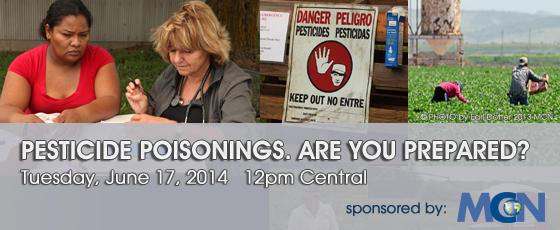 | |
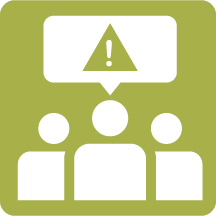 MCN’s Environmental and Occupational Health Programs
MCN’s Environmental and Occupational Health Programs
Learn more about MCN’s training and technical assistance programs to help clinicians and health centers improve the recognition and management of pesticide exposures and other environmental/occupational health conditions.
Mistakes can be dangerous. Accurate identification of pesticides responsible for a patient's illness is important to avoid iatrogenic errors with respect to acute treatment. Join us for an important webinar that will focus on key decision points in the diagnosis of pesticide exposures and emphasize the usefulness of the newly revised resource for clinicians - The Recognition and Management of Pesticide Poisonings, 6th ed. Through interactive case studies, this webinar will illustrate effective recognition and treatment of patients over exposed to pesticides.
The webinar, sponsored by Migrant Clinicians Network, the National Farm Medicine Center and AgriSafe Network features Dr. Keifer, a board certified occupational medicine specialist and internationally renowned researcher regarding pesticides and agricultural health and safety. For over 30 years, Dr. Keifer has focused his clinical practice and research largely on farmworkers.
SPONSORED BY: AgriSafe Network, Migrant Clinicians Network, and the National Farm Medicine Center
OBJECTIVES: Participants will be able to:
- Better recognize the signs and symptoms of pesticide overexposure
- Identify key decision points in diagnosing pesticide exposures
- Demonstrate an understanding of how to use The Recognition and Management of Pesticide Poisonings, 6th ed. in a clinical setting
We encourage all participants to order The Recognition and Management of Pesticide Poisonings, 6th ed. prior to attending this webinar. Order here. PDF versions are also available at http://www2.epa.gov/pesticide-worker-safety/recognition-and-management-pesticide-poisonings
If you have experienced any trouble ordering your copy please contact: kbrennan@migrantclinician.org
CLINICAL TOOLS & RESOURCES |
|
PATIENT EDUCATION MATERIALS |
|
ARCHIVED WEBINARS & TRAINING RESOURCES |
|
LOCAL PESTICIDE RESOURCES |
The following will provide information regarding the pesticides used in your areas:
|
- http://migrantclinician.adobeconnect.com/p77irjl7cvq/
- http://www.marshfieldclinic.org/nfmc/
- http://www.agrisafe.org/
- http://1.usa.gov/1aF9rHY
- http://www2.epa.gov/pesticide-worker-safety/recognition-and-management-pesticide-poisonings
- http://1.usa.gov/1fFUSZm
- http://bit.ly/1imO43V
- http://npic.orst.edu/
- http://www.aapcc.org/
- http://extoxnet.orst.edu/
- http://www.pesticidemededucation.com/
- http://www.extension.umn.edu/agriculture/pesticide-safety/program-team/
- http://www3.extension.umn.edu/county
- http://web.extension.illinois.edu/psep/about/psepteam.cfm
- http://web.extension.illinois.edu/state/findoffice.cfm
Part 5 of the 6 webinar series: Essential Clinical Issues in Migration Health
DATE RECORDED: June 5, 2014
PRESENTED BY: Katherine Brieger, RD and Elizabeth Magenheimer
To receive CME* or CNE credit after viewing any of these webinars you must do the following:
|
Diabetes continues to be one of the most common and challenging health condition confronting migrants and other underserved populations. It is clear that a healthy lifestyle is critical to mitigating the impact of diabetes on individuals and the population, however effective and appropriate interventions can be difficult to design. Fairhaven Community Health Center in Connecticut and Hudson River Healthcare in New York, are two health centers that have long led the way in creating culturally appropriate lifestyle programs for migrants and other underserved patients. In this session the presenters will discuss lessons learned from the development of a variety of programs for diabetics and other patients including a community garden, nutrition classes, cooking classes, weight management and strategies to encourage exercise. The session will address the clinical core measures related to nutrition and BMI and will also discuss current research test second line drug effectiveness in Type 2 DM. Available in English
Learning Objectives:
- Describe culturally appropriate diabetes intervention strategies
- Identify strategies to address clinical core competencies related to nutrition and BMI to improve quality care.
- Receive “take home” examples of how to incorporate effective nutrition, weight loss, exercise and other health lifestyle strategies.
FURTHER READING |
Download the Spanish Toolkit Materials
National Diabetes Information Clearinghouse, http://diabetes.niddk.nih.gov/dm/pubs/preventionprogram Bright Bodies, http://brightbodies.org |
- https://youtu.be/s9tdKcyE5OE
- http://www.cdc.gov/diabetes/ndep/pdfs/16-road-to-health-user-guide-spanish.pdf
- http://www.cdc.gov/diabetes/ndep/pdfs/17-road-to-health-activities-guide-spanish.pdf
- http://www.cdc.gov/diabetes/ndep/pdfs/18-road-to-health-resource-guide-spanish.pdf
- http://www.cdc.gov/diabetes/ndep/pdfs/19-road-to-health-flipchart-spanish.pdf
- http://www.cdc.gov/diabetes/ndep/pdfs/20-road-to-health-physical-activity-quiz-spanish-508.pdf
- http://www.cdc.gov/diabetes/ndep/pdfs/21-road-to-health-city-of-excuses-spanish.pdf
- http://www.cdc.gov/diabetes/ndep/pdfs/22-road-to-health-future-poster-spanish.pdf
- http://diabetes.niddk.nih.gov/dm/pubs/preventionprogram/
- http://diabetes.niddk.nih.gov/dm/pubs/preventionprogram
- http://brightbodies.org/
- http://brightbodies.org
Part 4 of the 6 webinar series: Essential Clinical Issues in Migration Health
DATE RECORDED: May 14, 2014
PRESENTED BY: Candace Kugel, FNP, CNM and Megan Danielson, CNM
To receive CME* or CNE credit after viewing any of these webinars you must do the following:
|
Migrant women face significant disparities with an additional layer of complexity and require different intervention strategies. Among them are reproductive health, pregnancy and childbirth, sexual and intimate partner violence, and cancers that disproportionately affect women, including cervical and breast cancer. Women often face environmental and occupational health exposures both in the home and in the workplace that heighten health risks. This session will provide a follow-up to the July 2013 presentation “Women’s Health at the Intersection of Poverty and Migration” that was part of our Clinician Orientation to Migration Health webinar series. During this presentation Candace Kugel, FNP, CNM, and Meagan Danielson, CNM will discuss quality improvement and health care services for migrant women. The HRSA clinical performance measures related to women’s health will be reviewed as well as resources and best practices for improving the health of migrant women.
Learning Objectives:
- Describe strategies to address clinical core measures that relate to women’s health .
- Discuss case studies that assist participants in understanding how creative collaborations and models of care can improve health outcomes for migrant women.
- Participants will be able to access clinical resources for working with female migrant patients.
FURTHER READING |
Low Birth Weight Resources
Cervical Cancer Resources
Other Resources
|
- WomenWebinar2014May12.pdf (999.83 KB)
- https://youtu.be/AJe7SVQxWTA
- http://www.healthcare.gov/
- http://www.healthcare.gov
- http://www.text4baby.org/
- http://www.text4baby.org
- http://www.migranthealth.org/
- http://www.migranthealth.org
- http://www.acog.org
- http://www.cdc.gov
- http://www.cancer.org
- http://www.rwhp.org
- http://cdc.gov/cancer/nbccedp
- http://bphc.hrsa.gov/policiesregulations/performancemeasures/index.html
- http://www.nashp.org/
- http://www.nashp.org
- http://bphc.hrsa.gov/spotlight/eriefamilyhc/index.html
- http://transform.childbirthconnection.org/
Part 6 of the 7 webinar series: Clinician Orientation to Migration Health
DATE: presented live on July 17th, 2013
PRESENTED BY: Candace Kugel, FNP, CNM, Specialist in Clinical Systems & Women's Health and Melissa Bailey, Executive Director of North Carolina Field, Inc.
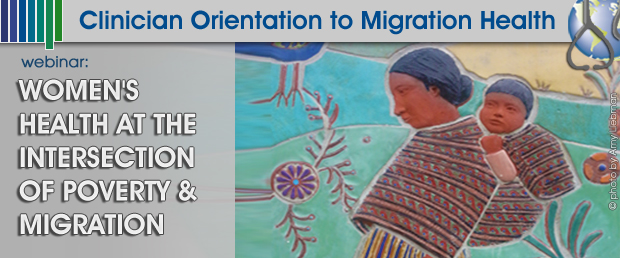 | ||
Additional Resources: |
MCN Women's Health page MCN Health Network: Any prenatal patient who may move out of your area before giving birth is eligible to be enrolled in the Health Network. MCN will provide care coordination throughout the course of her pregnancy, until her postpartum visit is completed, to help ensure that there are no gaps in her health care. 512-327-2017 or 800-825-8205.
MCN Environmental Health/Pesticides Resources
MCN Family Violence Resources
MCN Streamline articles
Other Women’s Health Resources for Migrant/Immigrant Care
|
Historically, the field of women's health consisted of issues surrounding reproduction and childbirth. However, increasingly, the health care community has come to see women as a distinct patient group that has unique health concerns over a lifetime. Migrant farmworker women experience unique risks during pregnancy and otherwise, due to the physical demands, environmental exposures and other circumstances of their lives. The provision of healthcare services to migrant women presents distinctive challenges for both clinicians and organizations. MCN’s Candace Kugel, CRNP, CNM, and Melissa Bailey, Executive Director of NC FIELD, Inc., both with many years of experience with this population will discuss the problems, solutions and rewards of working with migrant women, through case illustrations and review of resources.
After taking this webinar:
- Participants will be able to identify at least 2 health risks unique to women farmworkers and the impact of those challenges on work, nutrition and health.
- Participants will be able to describe environmental and occupational health exposures relevant to farmworker women of reproductive age.
- Case studies will assist participants in understanding how creative collaborations and models of care can improve health outcomes for migrant women.
- Participants will be able to access clinical resources for working with female migrant patients.
PRESENTER BIOS:
Candace Kugel, FNP, CNM, Specialist in Clinical Systems & Women's Health, Migrant Clinicians Network |
Candace Kugel is a Family Nurse Practitioner and Certified Nurse-Midwife with over twenty years of experience in health care for the underserved. She has worked in various clinical settings, including family planning, migrant health, community health center, and private practice. She has worked almost exclusively in rural settings. Candace has also been active in aspects of health care other than direct patient services. She has served as a clinical instructor for nurse practitioner, nurse-midwife, nursing, and medical students, and currently has faculty appointments with the University of Cincinnati and Penn State University’s Schools of Nursing. She has worked in program development in various arenas, including co-founding a “Stork’s Store” prenatal incentive program, initiating a natural family planning education program, and teaching childbirth education classes. |
Melissa Bailey, Executive Director of North Carolina Field, Inc. |
Melissa Bailey is a native of southern West Virginia. She has worked in North Carolina migrant education programs since 2001. In 2010 AFOP’s Children in the Fields Campaign assisted community workers with forming the nonprofit NC FIELD. This effort aimed to establish an organizational empowerment and advocacy model to build capacity in farmworker communities, particularly among child laborers in agriculture. In 2012 Melissa became the Executive Director of NC FIELD. She has presented to local, state, and national stakeholders; assisted media; has worked as a research assistant on farmworker studies; assisted with organizational development and the leadership training of child farmworkers, and is a successful field organizer, consultant, and project manager. Melissa holds a certificate in Nonprofit Management from Duke University, among other certifications related to the delivery of supplemental education services and data. In her spare time Melissa enjoys reading, writing, gardening, and spending time with loved ones. |
- http://migrantclinician.adobeconnect.com/p17n4u7kxek/
- http://252Fwww.migrantclinician.org/toolsource/resource/aunque-cerca...sano-pesticide-comic-book.html
- http://www.text4baby.org
- http://www.nccc.ucsf.edu/about_nccc/perinatal_hotline/
- http://www.centeringhealthcare.org
- http://www.rwhp.org
- http://www.augercommunications.com
- http://www.wakehealth.edu/Research/Family-Medicine/Educational-Materials.htm
- http://www.migranthealth.org
- http://www.womenshealth.gov
- http://www.marchofdimes.com/professionals/professionals.asp
- http://www.cdc.gov/spanish/mujer.htm
- http://www.nationalperinatal.org/trans.php
- http://www.cdph.ca.gov/programs/cdapp
- http://www.effectivehealthcare.ahrq.gov/ehc/products/107/510/Diabetes%20Spanish.pdf
- http://afop.org/wp-content/uploads/2010/07/The-Fields-PDF-2.13-version.pdf
- http://www.hrw.org
- http://www.legalmomentum.org/
- http://www.acf.hhs.gov/trafficking
These files are part of the Engaging Migrant Men project.
MCN developed 3 vignettes that portray the three messages developed in video and printed form.
- palabras_BI.pdf (354.68 KB)
- Palabras_SP.pdf (354.01 KB)
- para_BI.pdf (282.97 KB)
- para_SP.pdf (335.13 KB)
- vio 3 topics booklet_BI.pdf (371.19 KB)
- vio 3 topics booklet_SP.pdf (364.91 KB)
- violencia_BI as flyers.pdf (578.78 KB)
- violencia_SP as flyers.pdf (569.02 KB)
These files are part of the Engaging Migrant Men project.
Accompanying discussion guides were created to be used by male peers, community leaders, or outreach workers for one-on-one and small group discussions with men.
Part 1 of the 6 webinar series: Essential Clinical Issues in Migration Health
DATE RECORDED: March 19, 2014
PRESENTED BY: Deliana Garcia, MA, International Research and Development, Migrant Clinicians Network
To receive CME* or CNE credit after viewing any of these webinars you must do the following:
|
**Note: Due to technical difficulities the first 7 minutes of the presentation are not recorded. Please refer to the pdf of the slides for the content that was covered in those 7 minutes.
Over the last 30 years, considerable attention has been paid in the clinical setting to cultural competency- the ability to mitigate against the effects of the sociocultural differences between clinicians and patients and to take into account how culture affects the symptoms presented or the patients’ attitude about health care. More recently, scholars and clinicians have encouraged those in practice or health professions training to focus not only on the behaviors and beliefs of cultural groups but more importantly to consider the structural determinants, prejudices, injustices and blind spots, the “pathologies of social systems” that affect health outcomes and the stigma experienced by patients. The session will introduce participants to the broad framework of structural competency and the five core structural competencies.
Learning Objectives:
- Identify the structures that shape clinical interactions;
- Discuss the means of developing an extra-clinical language of structure;
- Rearticulate “cultural” formulations in structural terms;
- Explain the process of observing and imagining structural interventions; and
- Describe the concept of structural humility.
FURTHER READING |
Farmer, Paul, Bruce Nizeye, Sara Stulac, Salmaan Keshavjee. 2006. Structural Violence and Clinical Medicine. PLoS Medicine 2006 (3): 1686-1691. Holmes, Seth, Fresh Fruit Broken Bodies, 2013 Messac, Luke, Dan Ciccarone, Jeffrey Draine, Philippe Bourgois. 2013. The good-enough science-and-politics of anthropological collaboration with evidence-based clinical research: Four ethnographic case studies. Social Science & Medicine 99 (2013): 176-186 Quesada, James, Laurie Kain Hart, & Philippe Bourgois. 2011. Structural Vulnerability and Health: Latino Migrant Laborers in the United States. Medical Anthropology, Vol. 30, No. 4: 339- 362 Srivastava, Ranjana. Complicated Lives—Taking the Social History. New England Journal of Medicine 2011 (365): 587-589. Willen, Sarah. 2012. How is Health-Related “Deservingness” Reckoned? Perspectives from Unauthorized Im/migrants in Tel Aviv. Social Science & Medicine 74 (2012): 812-821. |
- StructuralCompetencyFinal.pdf (3.94 MB)
- https://youtu.be/smEPZKr-6gg
- http://www.plosmedicine.org/article/info%3Adoi%2F10.1371%2Fjournal.pmed.0030449
- http://sethmholmes.com/
- http://www.sciencedirect.com/science/article/pii/S0277953613002207
- http://www.haverford.edu/anthropology/faculty/hart/Medical-Anthropology-Structural-Vulnerability-and-Health--Latino-Migrant-Laborers-in-the-United-States.pdf
- http://www.ranjanasrivastava.com/wp-content/uploads/2013/01/Complicated-Lives.pdf
- http://www.sciencedirect.com/science/article/pii/S0277953611003984
Limited data document the multiple and repeated pesticide absorption experienced by farmworkers in an agricultural season or their risk factors.